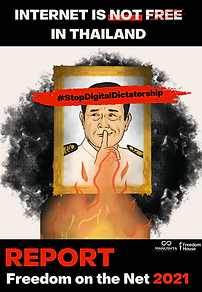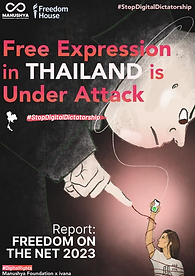DIGITAL RIGHTS
We recognize that the digital sphere is quickly emerging as one of the key spaces in which human rights are under threat.

Manushya Foundation works towards the promotion and protection of online freedom of expression and online privacy. To ensure local and marginalized communities and local journalists are not subject to governments’ attempts to control the digital world, resulting in silencing human rights defenders, censorship, and defamation charges, we encourage governments to align their national legislation and policies with international human rights standards. Similarly, we lobby the ICT sector to uphold digital rights and resist states’ pressure to control the internet. We encourage private companies to comply with the UN Guiding Principles on Business & Human Rights – in particular, Pillar 2 – related to the corporate responsibility to respect human rights and exercise human rights due diligence.
Our digital rights strategy aims to uphold online freedom and push back against authoritarian regimes. At Manushya Foundation, we work under the motto that “digital rights are human rights” and recognize that all human rights are also applicable in the digital realm. Governments and businesses must respect and protect human rights offline and online! Our online democracy is under threat in Southeast Asia, with increasing digital dictatorship in the hands of governments, cracking down on netizens, civil society, local communities, human rights defenders and journalists speaking their truth to power.
Our strategy on Digital Rights has two objectives:
1. Upholding Digital Rights, Online Freedom and Data Privacy by advocating for national legal frameworks and business activities to comply with international human rights standards and the UNGPs;
2. Enhancing Digital Literacy by raising awareness and building capacity of Netizens in Asia to navigate the digital world safely.
Objective 1: Upholding Digital Rights
(1) Denouncing the Rise of Digital Dictatorship in Southeast Asia, with the ASEAN Coalition to #StopDigitalDictatorship

End of 2020, we also launched a Campaign to #StopDigitalDictatorship in Southeast Asia to fight against rising digital dictatorship in the region, where the internet is no longer a free, safe, and secure space for expression. We joined forces with ASEAN partners to highlight the legal challenges to digital rights in the region while presenting their impact on netizens and proposing strategies to fight back digital dictatorship as shared by leading voices working on the ground.
Manushya Foundation, together with ALTSEAN-Burma, Bumi Setara (Indonesia), Cambodian Center for Human Rights, ELSAM (Indonesia), Foundation for Media Alternatives (FMA, Philippines), Free Expression Myanmar (Myanmar), ILGA Asia (Asian Region of the International Lesbian, Gay, Bisexual, Trans and Intersex Association), Rohingya Maiyafuinor Collaborative Network (Myanmar), SAFEnet (Indonesia), Viet Tan (Vietnam) and Women’s Peace Network (Myanmar), we are working together to restore our online democracy in ASEAN:
-
We denounce rights violations taking place in the digital space and provide governments, policy-makers, businesses and civil society with key recommendations to uphold online freedom of expression and privacy rights. We do so via joint statements, research and analysis to inform UN human rights reviews and UN Special Procedures thematic reports, joint research on emerging digital rights issues, and joint campaigns to hold governments and businesses into account.
-
We raise awareness and build capacity on digital rights via joint webinars, joint online workshops, and by joining international digital rights forums to tell the world what’s happening in our digital space in Southeast Asia.
Access all the materials of the ASEAN Coalition by taking a look at our Campaign here and see what you can do to #StopDigitalDictatorship!
On March 12, 2024, individuals from Southeast Asia and around the globe gathered in Bangkok, SEA Junction, for a hybrid event where six panel members discussed the state of digital repression in the region. Some attendees sought a broader transnational understanding of the issue, others were captivated by the inclusive perspectives shared by the panelists, and some simply aimed to broaden their general knowledge. Regardless, the comprehensive 350-page report is meant to meet all requirements. Over 4 years of collaborative effort and still counting, the coalition highlighted how governments in the region use vague laws to stifle freedom of speech, information, and privacy, granting them extensive monitoring powers over digital communication.
Access our first thematic report here
Access our Joint News Release here

.png)
Watch the soft launch of our coalition report here
Read more about our report through our various blog and social media posts below!
(2) Calling for Artificial Intelligence that Respects Human Rights in Thailand (2024)
On December 11, 2024, we launched our new report titled “Balancing Progress and Human Rights: Is Thailand Ready for AI That Respects Human Rights?” This report critically examines Thailand’s rush to adopt AI technologies, highlighting how the country’s legal framework is failing to evolve at the same pace, leaving dangerous gaps where human rights protections should be. Thailand's existing laws are woefully inadequate, with no clear safeguards against AI-driven data misuse and insufficient privacy protections. As a result, citizens are left vulnerable to widespread surveillance and exploitation. Current policies exacerbate this risk, allowing for massive data collection under the guise of national security, jeopardising individual privacy and freedoms across the nation. There is an urgent need for a comprehensive, human rights-centered AI law in Thailand. This new legislation must include strong protections against bias, ensure transparency, and promote inclusivity in AI development and application.

Access our report “Balancing Progress and Human Rights: Is Thailand Ready for AI That Respects Human Rights?" here
(3) Proposed Amendments to Thailand’s Cybersecurity Act (2019)
In Thailand, to realize our first objective, we are advocating for a Cybersecurity Bill which would respect online freedom and data privacy of Thai netizens, according to international human rights standards, while effectively tackling cyberattacks and cyber-threats. For that purpose, Manushya Foundation in collaboration with the Embassy of the Kingdom of the Netherlands in Bangkok launched a project to analyze the process of development, implementation and monitoring of the Cybersecurity Bill drafted by the Thai Government. The project aims at providing recommendations and good practices and led to the publication of a study in collaboration with other civil society members upholding digital rights, to respond to the growing concerns over the shrinking of online civic space entitled ‘Thailand’s Cybersecurity Act: Towards a Human-Centered Act Protecting Online Freedom and Privacy, While Tackling Cyber Threats’. The study is the first of its kind in ASEAN and the aim is to assist Thailand, its institutions, its private entities, and its netizens to strengthen and streamline the implementation of the National Cybersecurity Act in line with international human rights standards, promoting a human-centered approach to protect people, while opposing its misuse for the control and surveillance of citizens.

Access our “Thailand’s Cybersecurity Act” Study here

Access our Summary of “Thailand's Cybersecurity Act: DOs & DON'Ts” here
Watch the launch of our study here
(4) Freedom on the Net: Thailand’s Country Report
Since 2020, Manushya Foundation develops the yearly Thailand country report of ‘Freedom on the Net’ together with Freedom House, exploring the digital rights situation and investigating whether internet freedom has declined or improved since the past year. Check below and access the ‘Freedom on the Net country report for Thailand 2020’, ‘Freedom on the Net country report for Thailand 2021’, ‘Freedom on the Net country report for Thailand 2022’, ‘Freedom on the Net country report for Thailand 2023’, and ‘Freedom on the Net country report for Thailand 2024’.
Access our Freedom of the Net 2020 Report for Thailand here
Access our Freedom of the Net 2021 Report for Thailand here
Access the Joint Press Release of the report here
Access our Freedom of the Net 2022
Report for Thailand here
Access the Joint News Release of the report here
.png)






















.png)
